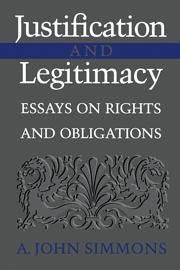Book contents
- Frontmatter
- Contents
- Introduction
- Acknowledgments
- 1 The Principle of Fair Play
- 2 Fair Play and Political Obligation: Twenty Years Later
- 3 The Obligations of Citizens and the Justification of Conscription
- 4 Associative Political Obligations
- 5 External Justifications and Institutional Roles
- 6 Philosophical Anarchism
- 7 Justification and Legitimacy
- 8 “Denisons” and “Aliens”: Locke's Problem of Political Consent
- 9 Human Rights and World Citizenship: The Universality of Human Rights in Kant and Locke
- 10 Original-Acquisition Justifications of Private Property
- 11 Historical Rights and Fair Shares
- 12 Makers' Rights
- Index
9 - Human Rights and World Citizenship: The Universality of Human Rights in Kant and Locke
Published online by Cambridge University Press: 05 June 2012
- Frontmatter
- Contents
- Introduction
- Acknowledgments
- 1 The Principle of Fair Play
- 2 Fair Play and Political Obligation: Twenty Years Later
- 3 The Obligations of Citizens and the Justification of Conscription
- 4 Associative Political Obligations
- 5 External Justifications and Institutional Roles
- 6 Philosophical Anarchism
- 7 Justification and Legitimacy
- 8 “Denisons” and “Aliens”: Locke's Problem of Political Consent
- 9 Human Rights and World Citizenship: The Universality of Human Rights in Kant and Locke
- 10 Original-Acquisition Justifications of Private Property
- 11 Historical Rights and Fair Shares
- 12 Makers' Rights
- Index
Summary
Kant's cosmopolitanism is nowhere more evident than in his essay Perpetual Peace. Cosmopolitan right is there described as “a universal right of humanity,” derived from the idea that “individuals … may be regarded as citizens of a universal state of mankind (ius cosmopoliticum).” Kant's apparent appeal to the idea of “world citizenship” as the basis for human rights claims, of course, calls to mind both older, Stoic employments of that idea (with no corresponding theory of rights) and contemporary uses of the idea to defend robust accounts of universal human rights. Readers of Kant may be disappointed, then, to find him asserting that “cosmopolitan right shall be limited to conditions of universal hospitality,” where this “right of hospitality” amounts only to “the right of a stranger not to be treated with hostility when he arrives on someone else's territory.” Indeed, cosmopolitan right permits even that this stranger “may be turned away, if this can be done without causing his death.” Kantian “citizens of the world,” it seems, benefit only quite minimally from their membership in the world community.
Similarly, while Kant in Perpetual Peace has much to say about the civil rights of citizens (as well as the rights of rulers) within established states, and about the international rights of states with respect to one another, his few passing references to the natural rights of persons or the sacred “rights of man” are quick and vague (and often confined to footnotes).
- Type
- Chapter
- Information
- Justification and LegitimacyEssays on Rights and Obligations, pp. 179 - 196Publisher: Cambridge University PressPrint publication year: 2000
- 3
- Cited by



